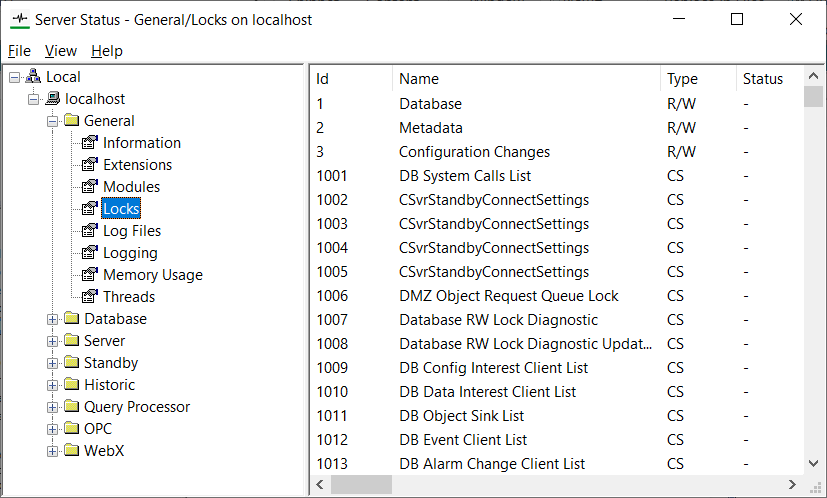The Locks category provides status information about the software locks. Typically, you will only need to view the lock status when asked to do so by Schneider Electric engineers—the engineers might use the status information to diagnose performance issues such as latency.
For diagnostic information regarding database locks in Geo SCADA Expert, see Lock Diagnostics Read and Lock Diagnostics Write. The Locks category displays all locks within the server, whereas database locks are specific to the 'database' and assist in identifying which operation is causing high lock utilization.

The status information for each lock is categorized as:
- Id—A unique number that Geo SCADA Expert uses to identify the lock.
- Name—The name that has been allocated to the lock. Typically, this indicates the software component to which the lock relates. In some cases, reference is also made to:
An Advise Links Id (such as A04#01), which corresponds to the Id column in the Advises category of the Server Status Tool.
A Comms Child Links Id (such as PL0:CL1), which corresponds to the Id column in the Comms Child Links category of the Server Status Tool.
A Server Links Id (such as L06#03), which corresponds to the Id column in the Server Links category of the Server Status Tool.
For more information about the Database read and write locks, see Lock Diagnostics Write and see Lock Diagnostics Read.
- Type—Indicates the type of lock. The lock can be R/W (which means there are multiple readers and no writers, or there are no readers and 1 writer) or CS (which means there is 1 reader or writer with exclusive access).
- Status—Indicates whether the lock is active. The status can be:
- Locked
- Unlocked (unlocked is indicated by a - sign)
- Write, Thread <n> (where <n> is the ‘ID’ of the thread with the write lock). The resource is locked for writing.
- Read, Count <n> (where <n> is the number of threads that have the lock). The resource is locked for reading. A resource cannot be written to and read at the same time.
For more information, see Threads.